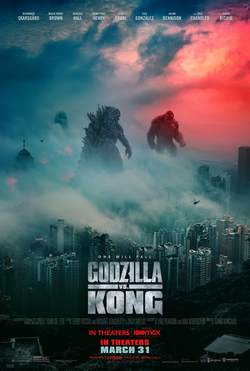“Godzilla vs. Kong” is a fulfilled promise but disappointing cinema

Wikipedia Commons
“Godzilla vs. Kong” is a crescendo of three previous “MonsterVerse” movies.
Legendary Entertainment first kicked off the franchise that would eventually be known as the “MonsterVerse” in 2014 with a reboot of the classic series of monster films, “Godzilla”. After a generally positive critical reception, 2017’s “Kong: Skull Island” and 2019’s “Godzilla: King of the Monsters” were released to positive and negative reviews, respectively.
Now, in 2021, a fourth film has been released for the franchise, “Godzilla vs. Kong”. This film features iconic monsters Godzilla and Kong in a brutal, CGI-laden battle as a new threat rises in their wake. The film has garnered generally positive reviews from critics and is notable for having the most successful box office debut since the beginning of the COVID-19 pandemic.
The film certainly delivers on its promise to showcase two gigantic monsters fighting for the right to be called “king.” There is a monster present in almost every scene of the film, and the climactic brawl between Godzilla and Kong is all of the joyful spectacle with zero regard for human life that fans of the franchise could have possibly hoped for. Supporters of Team Godzilla may be a bit disappointed to see Kong’s side of the story completely outshine the giant sea monster’s both in terms of screen time and complexity, but Godzilla does receive his fair share of action toward the end of the film.
Of course, as with all of the “MonsterVerse” films, the glaring weakness of “Godzilla vs. Kong” is its total lack of effort in developing interesting human characters. In the few scenes where Godzilla or Kong is not on screen, the movie grinds to a complete halt as flat, one-note characters stand around in a room spewing mundane exposition.
There are fewer of these scenes than in past films in the franchise, but the characters here are perhaps the worst that have ever been in a “MonsterVerse” movie. Unfortunately, viewers will absolutely feel this frankly boring slog of bare-minimum plot and character establishment, leaving them pining for the moment that the titular beasts return.
This problem is the most disappointing aspect of “Godzilla vs. Kong” and the franchise altogether. These films simply mean nothing. The argument can be made that audiences are just not watching these movies for compelling characters or themes. That is probably true, but that should not stop the filmmakers working on these movies from trying altogether.
What makes the situation worse is that the potential is clearly there for a very interesting exploration of humanity’s hubris. In the very first film of the “MonsterVerse”, “Godzilla”, the writers were on the cusp of touching on something interesting, namely the carelessness humanity has come to with the testing of nuclear weapons as well as its hostility toward the world’s nonhuman creatures. Several characters state, albeit in passing, that Godzilla was initially only awoken due to several attempts to kill him years before the events of the film.
Even during the movie, the terroristic monsters (called MUTOs) feed upon nuclear waste and radiation leftover from various detonations and power plants. However, these themes are never fully tackled as the film descends into the mayhem of fighting monsters.
More success comes in “Kong: Skull Island”, where themes of environmentalism and revenge are tackled. Much like in “Godzilla”, Kong himself only attacks the invading humans when they begin bombing the surface of Skull Island. In addition, Kong is portrayed as an apex predator that keeps the entire island’s populations in order.
Half of the characters wish to kill Kong to avenge the deaths of their friends, while the other half insists Kong must live so as to avoid awakening a more vicious monster. This immediately gives the humans some level of interest while hinting at a larger picture. Of course, these themes are not delved into very deeply, but they are at least present.
“Godzilla: King of Monsters” sees the complete disposal of what little thematic intrigue there was, resulting in horribly uninteresting characters and a quite abysmal movie when Godzilla is not present. “Godzilla vs. Kong” is much the same.
Many critics have praised “Godzilla vs. Kong” for fulfilling its promise to showcase exciting monster action between two beloved beasts, cutting remarkable slack with every other element of the film being hilariously weak. Indeed, the audience gets exactly what it wants, but why should it not receive even more?
Potential themes for the “Godzilla vs. Kong” could have again been complacency regarding nuclear weapons, environmentalism, and human arrogance, but with this film in particular, topics like humanity’s ultimate lack of control, society’s failure to protect its people, and the extent to which countries are even able to rebuild after a disaster could have been addressed while retaining the epic monster action. There is enormous carnage as Godzilla and Kong fight in the middle of a well-populated city, yet no one in the movie seems to care in the slightest. This results in a huge tonal disconnect that could have easily been avoided.
The “Godzilla” franchise in particular is not even a stranger to thematic commentary on society’s happenings and the human condition. The original Japanese franchise featured metaphors pertaining to the national attitude following World War II.
“Godzilla vs. Kong” is undoubtedly a fun movie to watch. Seeing a giant ape punch a giant lizard with atomic breath is so ridiculous that it is immensely exciting to see play out on screen. The film thankfully does not take itself seriously at all, and this will leave many viewers entertained and satisfied enough. With its unprecedented box office success, the “MonsterVerse” will very likely receive more installments in the future, which is only a good outlook for fans.
Still though, there will always be a hint of disappointment associated with the viewing of this film. It truly makes zero effort to be more than what everyone knew it was going to be. The movie will make for an enjoyable experience, but seeing the potential present, some of which has almost been fulfilled in past movies of the franchise, leaves the film ultimately ringing hollow.
“Godzilla vs. Kong” is now in theaters and streaming on HBO Max through April 30.
Hey! I’m from Bryant, Arkansas. I’m a Digital Media Production major and Innovative Media minor. I write movie reviews for the Oracle and I’m also an editor/staff member for Henderson Television....










